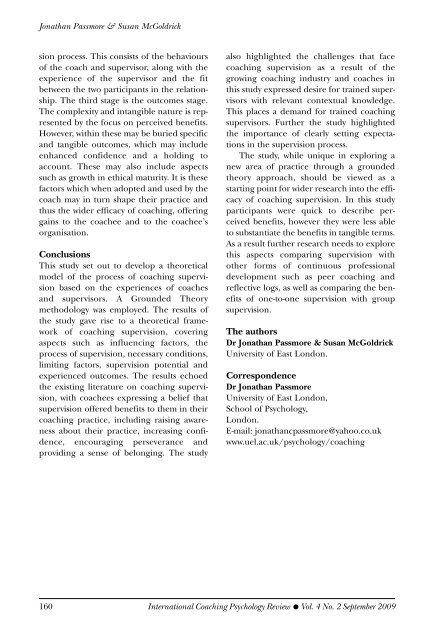International Coaching Psychology Review, 4.2, September 2009
International Coaching Psychology Review, 4.2, September 2009
International Coaching Psychology Review, 4.2, September 2009
Create successful ePaper yourself
Turn your PDF publications into a flip-book with our unique Google optimized e-Paper software.
Jonathan Passmore & Susan McGoldrick<br />
sion process. This consists of the behaviours<br />
of the coach and supervisor, along with the<br />
experience of the supervisor and the fit<br />
between the two participants in the relationship.<br />
The third stage is the outcomes stage.<br />
The complexity and intangible nature is represented<br />
by the focus on perceived benefits.<br />
However, within these may be buried specific<br />
and tangible outcomes, which may include<br />
enhanced confidence and a holding to<br />
account. These may also include aspects<br />
such as growth in ethical maturity. It is these<br />
factors which when adopted and used by the<br />
coach may in turn shape their practice and<br />
thus the wider efficacy of coaching, offering<br />
gains to the coachee and to the coachee’s<br />
organisation.<br />
Conclusions<br />
This study set out to develop a theoretical<br />
model of the process of coaching supervision<br />
based on the experiences of coaches<br />
and supervisors. A Grounded Theory<br />
methodology was employed. The results of<br />
the study gave rise to a theoretical framework<br />
of coaching supervision, covering<br />
aspects such as influencing factors, the<br />
process of supervision, necessary conditions,<br />
limiting factors, supervision potential and<br />
experienced outcomes. The results echoed<br />
the existing literature on coaching supervision,<br />
with coachees expressing a belief that<br />
supervision offered benefits to them in their<br />
coaching practice, including raising awareness<br />
about their practice, increasing confidence,<br />
encouraging perseverance and<br />
providing a sense of belonging. The study<br />
also highlighted the challenges that face<br />
coaching supervision as a result of the<br />
growing coaching industry and coaches in<br />
this study expressed desire for trained supervisors<br />
with relevant contextual knowledge.<br />
This places a demand for trained coaching<br />
supervisors. Further the study highlighted<br />
the importance of clearly setting expectations<br />
in the supervision process.<br />
The study, while unique in exploring a<br />
new area of practice through a grounded<br />
theory approach, should be viewed as a<br />
starting point for wider research into the efficacy<br />
of coaching supervision. In this study<br />
participants were quick to describe perceived<br />
benefits, however they were less able<br />
to substantiate the benefits in tangible terms.<br />
As a result further research needs to explore<br />
this aspects comparing supervision with<br />
other forms of continuous professional<br />
development such as peer coaching and<br />
reflective logs, as well as comparing the benefits<br />
of one-to-one supervision with group<br />
supervision.<br />
The authors<br />
Dr Jonathan Passmore & Susan McGoldrick<br />
University of East London.<br />
Correspondence<br />
Dr Jonathan Passmore<br />
University of East London,<br />
School of <strong>Psychology</strong>,<br />
London.<br />
E-mail: jonathancpassmore@yahoo.co.uk<br />
www.uel.ac.uk/psychology/coaching<br />
160 <strong>International</strong> <strong>Coaching</strong> <strong>Psychology</strong> <strong>Review</strong> ● Vol. 4 No. 2 <strong>September</strong> <strong>2009</strong>

















